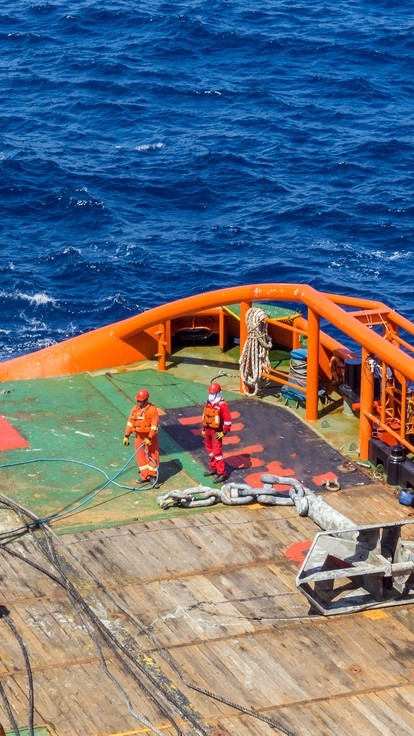Silverburn Shipping (IOM) Ltd -v- Ark Shipping Co LLC (THE M/V “ARCTIC”) [2019] EWHC 376 (Comm)

Details
In this case, the Commercial Court considered an appeal under Section 69 of the Arbitration Act brought by Silverburn Shipping (IoM) Ltd (the owners) challenging an award in favour of Ark Shipping Company LLC (the charterers) on the grounds that the obligation to keep the vessel in class at all times under a bareboat charter is both an absolute obligation and a condition of the charter.
Factual background
The M.V. Arctic was a new-build anchor-handling vessel classed with Bureau Veritas and owned by Silverburn Shipping. In October of 2012, owners’ demise chartered the vessel to Ark Shipping under an amended Barecon ’89 form for a period of 15 years.
Five years into the charter, the vessel was due to undergo her special survey. Her class certificates were due to expire on 6 November 2017. Due to inadequate preparation by the charterers, the vessel’s class certificates expired. A dispute also arose between the parties in relation to apparent poor maintenance and unpaid hire. In December 2017, owners wrote to charterers stating their concern for the poor maintenance of the vessel, unpaid hire, and the now expired certificates of class. At this point, owners purported to terminate the charter with immediate effect due to charterers’ failure to comply with Clause 9 of the charterparty, withdrawing the vessel immediately from charterers’ service.
Clause 9A of the amended Barecon ’89 provided:

The deletion of the reference to Clause 13(l) in the amended form makes it clear that the obligation to keep the vessel in class lays with the charterers. In situations where this provision is not deleted, then the obligation would rest with owners.
Charterers disputed the termination of the charterparty and demand for the redelivery of the vessel denying any breach and contending that the charterparty was still alive. They argued that the vessel was in a good state of repair, and that owners were aware that she was currently undergoing scheduled maintenance in dry dock with BV in attendance, and that the certificates that had lapsed would be renewed following completion of the work.
Arbitration
Owners initially applied to the tribunal on an urgent basis for a declaration that the charterparty was lawfully terminated due to, inter alia, charterers’ failure to keep the vessel with unexpired class certificates as required by Clause 9A.
The tribunal rejected the application, concluding that was no good reason to differentiate between obligations in Clause 9A as to class certificates from those for general repair and maintenance. On this interpretation, charterers would be allowed a ‘reasonable time’ to reinstate any expired certificates of class before any right to terminate arose. They found that the obligation to keep the vessel in class was not an ‘absolute’ obligation, but rather an intermediate obligation that required only reasonable due diligence to be exercised. Therefore, the obligation to keep the vessel in class was not a condition of the charterparty, and did not give owners the right to terminate.
Owners appealed the decision under section 69 of the Arbitration Act 1996 on the basis that the tribunal had erred in their application of the law in relation to what they believed to be a repudiatory breach of the contract, and further that this was a point of general public importance. Leave to appeal was granted on the basis that the tribunal reached conclusions on two points of law that were ‘at least open to serious doubt’.
High Court
On appeal, Mrs Justice Carr noted that the Barecon ’89 form is an industry standard form, and the most commonly used form for bareboat charters worldwide. Hence, the issues raised regarding the tribunal’s award could be said to be of general public importance. Further, the questions in issue had not been considered by the court previously, and there was therefore benefit in providing certainty for such a broadly used contract.
Owners raised two arguments on appeal. First, that the tribunal came to the conclusion it did by comparing Clause 9A of the Barecon to similar clauses in a NYPE time charter, and this analogy was wholly unsuitable. Secondly, owners argued that the tribunal had wrongly conflated the obligations of repair and maintenance with that of keeping the vessel with unexpired class certificates.
Turning to the first issue, owners argued that a bareboat charter is fundamentally different from a time charter in that the vessel is entirely at the disposal of the charterers. Owners have no crew on board, no right to contract with the class society directly, and no right to force the charterers to dock the vessel for inspection. Therefore, owners of a vessel under a bareboat charter have significantly less control in ensuring a vessel is kept in class, but are still open to the adverse consequences if the vessel is not in class, such as insurance cover, flag state compliance and mortgage providers’ requirements. Owners will undoubtedly have stipulations in their relevant contracts that require the vessel to be in class at all times, and failing to do so could place owners without cover, but also without the ability to remedy the situation directly.
In relation to the second issue, owners argued that the tribunal erred in interpreting the part of Clause 9A that dealt with charterers’ requirement to keep the vessel with unexpired class certificates with the subsequent sentence stating that necessary repairs are to be completed in a reasonable time. Owners argued that the two sentences are to be read distinctly and separately, citing the unambiguous terms used in the contract; ‘they shall keep the vessel with unexpired classification of the class indicated in box 10 and with other required certificates in force at all times.’ The language used was purposefully clear and unambiguous. It should not be read in the same vein as the following sentence regarding maintenance, which allowed a reasonable time for charterers to make any necessary repairs. Owners case was that while repairs and maintenance could potentially be a qualified obligation due to the subjective interpretation required to evidence the same, keeping a vessel in class could not; a vessel is either in class, or she is not.
Owners further referred to the case of the Seaflower (BS & N Ltd -v- Micado Shipping Ltd (The ‘Seaflower’) [2001] 1 Lloyd’s Rep 341), in which the court held that a vessel’s class was distinct from its physical condition, and therefore the maintenance of class and maintenance of condition were two distinct obligations. Owners had referred the tribunal to the Seaflower, but they had judged it to be ‘distinguishable on the facts’, but failed to identify the distinction.
The court was therefore required to decide two questions of law:
- Is charterers’ obligation to keep the vessel with unexpired class certification an absolute obligation?
- Is charterers’ obligation to keep the vessel with unexpired class certification a condition of the contract, or an innominate term?
Absolute obligation
Considering the evidence presented, the Court found in favour of the owners, stating that there is a ‘natural and ready distinction’ to be made between a vessel’s physical condition and its classification status. The clause would require significant additional wording to be inserted into the final sentence of Clause 9A to make it readily apparent that charterers were to be permitted a reasonable time to bring the vessel back into class should any certificates of class expire contrary to the clear meaning in the preceding sentence. The court held that the tribunal erred in law in finding that the classification obligation was only an obligation to reinstate expired class certificates within a reasonable time. The classification obligation was an absolute one.
Condition or innominate term
The court was then required to determine whether the obligation ‘to keep the vessel with unexpired classification of the class … in force at all times’ was a condition of the contract or an innominate term. The answer to this question would determine whether the owners were entitled to terminate the charterparty, or only entitled to damages.
Carr J considered a number of relevant authorities in relation to key factors of commercial contracts, including the intentions of the parties, certainty, and time being of the essence. The court was also aware that they should not be too ready to construe a term in a contract as a condition, giving the right to terminate in situations where it would be unjust to do so.
Carr J found that the term was a condition of the contract, the breach of which entitled the owners to terminate the contract. The clause created an obligation on charterers ‘breach of which is immediately and objectively ascertainable’. She further reasoned that it was clear there was a ‘temporal element’ in the wording of the clause that the vessel must be kept in class ‘at all times’, demonstrating that time was to be of the essence in this respect. ‘The language of the obligation is in no way inconsistent with the concept of its being a condition, and if anything suggests that it is. It is clear and absolute with a fixed time limit, redolent of a condition’. In relation to the parties’ intentions for recourse for such a breach, the court found that ‘the obvious intention of the party would be that… owners would have the right of termination’.
Conclusion
The judgment from the High Court serves as a clear reminder to charterers to ensure compliance with their obligation to keep a vessel in class at all times. Failure to do so will give owners the right to terminate the charterparty and demand return of the vessel.
As identified by the court, failure to keep a vessel in class can have wide reaching consequences for owners, who may have few rights to intervene under the charterparty, but will suffer the dire consequences of failure to keep the vessel in class. Insurers will inevitably require the vessel to be in class at all times, with expired certificates almost certainly resulting in termination of cover. Consequently, owners are open to a large degree of risk that they can take little action to prevent.
The Court’s decision in this case highlights the fact that although documentary obligations under a charterparty may be a lesser concern to charterers, failure to comply can lead to expensive repercussions including the termination of the charterparty and loss of use of the vessel.
This article originally appeared in the March 2019 edition of shipping case digest. Other articles include:






